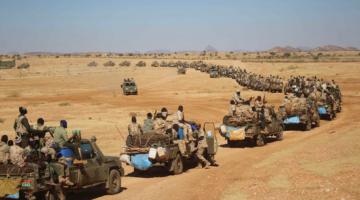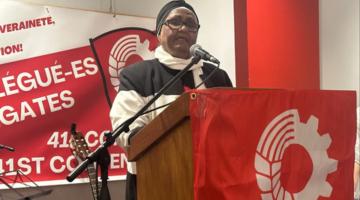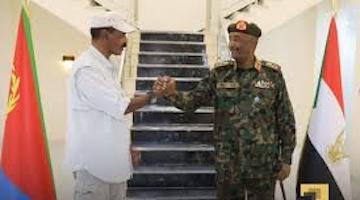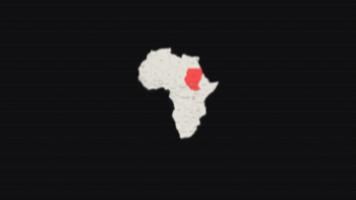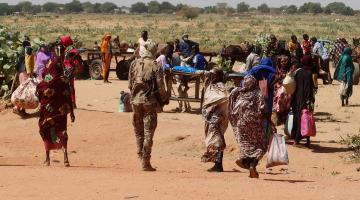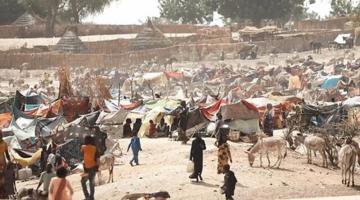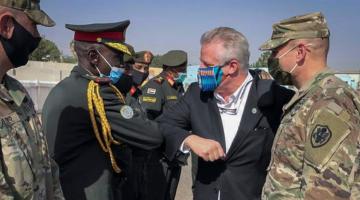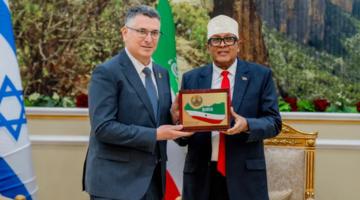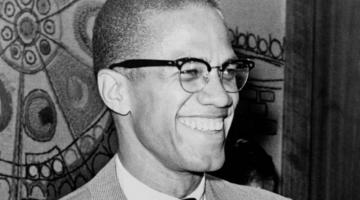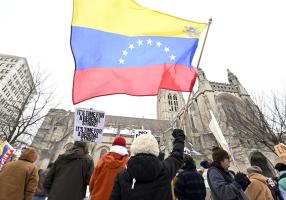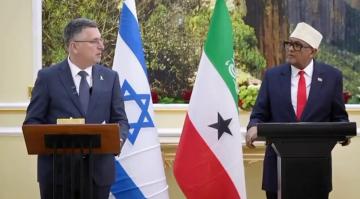Sudanese refugees in Chad. Over 10 million people have been forcibly displaced in over a year of war in Sudan. Photo: Wikimedia commons.
The UAE has played a significant role in Sudan’s economic landscape over the past decade, and it appears willing to maintain its involvement amid ongoing conflict.
This article was first published in Al-Akhbar English.
Last month, the Sudanese army accused Libya’s Khalifa Haftar of coordinating a joint border attack with the Rapid Support Forces (RSF). Although this marks the first time direct Libyan involvement in Sudan’s ongoing conflict has been alleged, it adds to growing evidence of the United Arab Emirates, Haftar’s main supporter, being involved in the Sudanese civil war.
The UAE has also been accused of financing and arming the RSF, led by Mohammad Hamdan Dagalo also known as “Hemedti”, and one of two main parties in Sudan’s civil war. This included funneling weapons to the Darfur-based group under the guise of humanitarian aid operations for displaced Sudanese in Chad.
Such acts raise the question: what exactly are the Emirates’ interests in Sudan? A report by the French Institute for Research in Africa, titled “Gulf States: A Paradoxical Economic Lifeline for Sudan”, highlights how Gulf countries, including the UAE, were deeply engaged in Sudan’s economy even during the era of international sanctions under former president Omar al-Bashir. Despite the political risks, they were able to invest heavily in trade, banking, agriculture, and much more thanks to their readily available capital. Specifically, the UAE has played a significant role in Sudan’s economic landscape over the past decade, and it appears willing to maintain its involvement amid ongoing conflict.
1. Sudanese gold fuels the RSF, and the UAE
Sudan’s gold industry has become the lifeblood of its civil war. Nearly all of the trade is channeled through the United Arab Emirates, which enriches both the army and the paramilitaries.
The United Arab Emirates has been the primary buyer of Sudanese gold since at least the early 2010s and remains the leading destination for smuggled gold from Sudan. According to official data, the UAE imported USD 2.29 billion worth of Sudanese gold in 2022. However, the actual figures are likely much higher. An estimated 90% of Sudan’s gold production, amounting to approximately USD 13.4 billion in illicit trade, is smuggled out of the country, often passing through transit routes in Chad, Egypt, Ethiopia, Uganda, and South Sudan before reaching the UAE.
However, gold only became a strategic asset for Sudan between 2011 and 2012. This was due to the loss of 75% of its oil reserves following South Sudan’s secession, the discovery of significant gold deposits in North Darfur, and rising global gold prices. In response, the Sudanese government centralized control over gold, and by 2012, it made up 60% of the country’s exports.
Since 2014, Emiral Resources, a Dubai-registered Russian-Emirati company, has been active in Sudan’s gold mining sector through its subsidiary, Alliance for Mining Co. Ltd. The company is a major producer, yielding approximately three tons of gold annually. Alliance for Mining was established as a joint venture between Kush E&P (68%), the state-owned Sudamine (25%), and an unidentified private shareholder (7%). Kush E&P is suspected of having ties to the RSF, which has been observed providing security for the company’s operations in South Kordofan.
The discovery of gold in Jebel Amer brought wealth and local governance to North Darfur. Tribes waged fierce wars to assert control over the gold mines in the region during 2013 and 2014, before the area came under the control of the Janjaweed militia and then the Rapid Support Forces (RSF) starting in 2017.
After Al-Bashir’s fall, the transitional government wanted to acquire ownership of the Jebel Amer mines. This was done after a deal was made to provide USD 200 million in compensation to the Al-Junaid Company, as well as a 33% stake in Sudamin, a state-affiliated mining firm, to the Dagalo family.
When civil war erupted in 2023 between the RSF and SAF, both forces were vying for control of the state and its financial resources. The RSF quickly captured the Sudan Gold Refinery in Khartoum, which held 1.6 tonnes of refined gold and additional unprocessed stock valued at USD 150.5 million. Even though the economy has severely shrunk since the start of the war. In February, the state-owned Sudan Mineral Resources Company said gold production reached 64 tons in 2024, up from 41.8 tons in 2022.
2. Breadbasket of the United Arab Emirates
Since the 1970s, Gulf states have invested in Sudan’s agricultural sector as part of efforts to tackle regional food insecurity. The idea of Sudan serving as the “breadbasket of the Arab world” fueled a drive for agricultural mechanization, a vision formally backed by Gulf nations as early as 2003. As the leading agricultural producer in both Africa and the Middle East, agriculture continues to be the cornerstone of Sudan’s economy, making up 60% of total exports and contributing one-third of the GDP in 2022, according to the African Development Bank (AfDB).
Sudan plays a key role in fulfilling the UAE’s food demand, given that the UAE imports 90% of its food due to limited arable land and water scarcity. To safeguard its food supply, the UAE has developed a global agricultural network covering around 1 million hectares of farmland, connected through ports and logistics hubs. A significant share of this farmland is located in Africa, with Sudan attracting a large portion of Emirati investment, primarily focused on animal feed as well as crop production and livestock.
Amid the ongoing conflict, two Emirati companies – International Holding Company (IHC), the UAE’s largest publicly traded firm, and Jenaan – were cultivating more than 50,000 hectares of land in Sudan. Shortly before the outbreak of war, IHC signed an agreement with the DAL Group to develop an additional 162,000 hectares of farmland in Abu Hamad, northern Sudan.
However, in the years preceding the war, several Emirati efforts to secure additional agricultural deals in Sudan were rejected by the Sudanese government. The government opposed these agreements because they involved disproportionate profits for the UAE while offering minimal benefits to local communities.
The RSF, known for its disregard for human rights, has become a “practical option” for foreign investors, a Sudanese expert told MEE. “The Emiratis preferred to loot the land’s wealth,” he said. “When they failed to land grab, they began to directly colonize, by using the RSF.”
3. Controlling strategic ports
With a 700 km coastline along the Red Sea, Sudan is strategically important for the UAE’s regional ambitions. Its location makes it a prime target for the UAE’s efforts to gain control over key ports. As seen elsewhere in the Horn of Africa, the UAE typically advances such interests through commercial fronts like Abu Dhabi Ports and Dubai Ports.
In 2020, Sudanese officials, speaking anonymously to Al Jazeera, revealed that the government was negotiating a deal with UAE-based logistics giant Dubai Ports World (DP World) to manage the South Port Container Terminal at Port Sudan. However, the proposed agreement faced strong opposition from the Sudanese Ports Authority and trade unions, who firmly rejected the private operation of such a critical national asset.
In 2020, Al-Monitor reported that DP World signed a USD 5 million lobbying contract with Ari Ben-Menashe and his Montreal-based firm, Dickens & Madson. Ben-Menashe, a former Israeli intelligence operative, was hired to lobby on behalf of DP World to secure a 20-year concession in Sudan.
In December 2022, the Sudanese government signed a deal with an Emirati consortium comprising the state-owned Abu Dhabi Ports Group and Invictus Investment to develop the Abu Amama port on the Red Sea. The site, which previously hosted a small naval base, was slated for relocation to make way for the Emirati project. This development holds strategic significance for the UAE, as it supports AD Ports Group’s broader expansion near the Suez Canal.
The investment, valued at six billion dollars, involves the development of the Abu Amama port complex, located 200 km north of Port Sudan. The deal also includes the creation of a free-trade zone and the construction of a 500 km road linking the port to the previously mentioned large-scale agricultural project.
4. Dominating Sudan’s financial infrastructure
Before the war, Sudan’s banking sector was underdeveloped as a result of prolonged US sanctions that cut the country off from the global financial system. These sanctions effectively banned most commercial and financial dealings with Sudan. It wasn’t until 2017 that the US began easing restrictions, allowing Sudan to reconnect with international banking institutions.
During the period of US sanctions, the Faisal Islamic Bank of Sudan and the Abu Dhabi Islamic Bank were virtually the only institutions that facilitated financial transfers to and from Sudan. Additionally, Emirati investment in Sudan’s financial sector had already been growing well before the sanctions were lifted.
Two decades ago, the government offered the state-owned Bank of Khartoum for sale. Founded in 1913, it is Sudan’s largest and oldest bank. In 2005, the government sold 60% of its shares to Dubai Islamic Bank, which then merged with Emirates and Sudan Bank in 2008. The latter was founded by a consortium of UAE banks and became majority-owned by these entities.
Around the same time, the Sudanese government privatized El Nilein Bank, selling a 60% stake to Bahraini Al-Salam Bank and Emirati investors. The bank has a branch in Abu Dhabi, where Tradive General Trading LLC, owned by Hemedti’s brother Algoney Dagalo, holds an account used to facilitate financial transfers to the Rapid Support Forces (RSF).
Abu Dhabi Islamic Bank became the first foreign bank to open in Sudan in 2012, with former President al-Bashir attending the opening ceremony. It was followed by Abu Dhabi National Bank, which launched operations in 2013. Notably, the National Bank of Abu Dhabi is connected to an RSF account involved in recycling gold revenues.
Today, many joint banks in Sudan include Gulf investors as well as politicians, politically connected elites, and their families, who often hold significant shares. For example, Al Khaleej Bank, in which Emirati firm Al-Jil Al-Qadem General Trading LLC owns 14%, is controlled by the RSF and Hemedti’s family.
Most foreign banks operating in Sudan are headquartered in Gulf states, primarily Saudi Arabia, the United Arab Emirates, and Qatar. Together, these seven foreign banks hold 23% of Sudan’s total banking assets. Their main goal is to support and facilitate Gulf investments throughout the Sudanese economy.
One could argue that the UAE’s involvement in the war is to secure its position as a leading provider of financial services in Sudan.
5. A Gulf proxy war
An article in ADF Magazine argued that Sudan’s war has developed into a proxy conflict between two Arab Gulf nations vying to expand their influence in Africa. On the side of the Sudanese Armed Forces (SAF) is Saudi Arabia, which has built a close relationship with SAF leader General Abdel Fattah al-Burhan. Meanwhile, the United Arab Emirates has aligned itself with the Rapid Support Forces (RSF).
This reflects a rivalry that has been brewing in recent years. Traditionally, the two countries have been allies, united by shared regional interests, including hostility toward Iran and a mutual opposition to Islamist movements. However, economic competition has strained their relationship, most notably through Saudi Arabia’s Regional Headquarters Program, which mandates that multinational companies operating in the Middle East establish their regional headquarters in the Kingdom, thereby bypassing established hubs like Dubai.
In the Sudanese context, Saudi leaders view the Red Sea as vital to the Kingdom’s economic growth, both as a hub for tourism and as a strategic route to safeguard oil exports by reducing reliance on the Strait of Hormuz. During the war in Sudan, Saudi Arabia has sought to position itself as an intermediary by hosting peace talks and trying to boost its international reputation and legitimacy, particularly under the leadership of Crown Prince Mohammed bin Salman.
The UAE’s actions in Sudan align with Abu Dhabi’s broader strategy of supporting non-state actors (often with secessionist tendencies) to gain access to valuable resources and strategic locations. This approach mirrors the UAE’s involvement in other regions, notably eastern Libya and Somalia, according to analyst Elfadil Ibrahim.
“Ultimately, Sudan is paying the price for this fractured Gulf relationship,” Ibrahim wrote recently for Responsible Statecraft. “As long as the rivalry persists, Sudan will remain tragically caught in the crossfire.”

